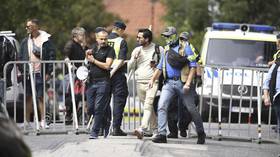Sweden blames Moscow for outrage over Quran-burning stunts
Sweden’s prime minister has accused Russia of using a “disinformation campaign” to tarnish Stockholm’s image abroad, alleging that Moscow has spread false claims about the recent Quran-burning incidents in the Swedish capital.
Ulf Kristersson took to social media on Wednesday to declare that “states and state-like actors” were targeting Sweden with misinformation.
“Among other things, we see that Russian actors are active in spreading the false claim that Sweden as a state would be behind the desecration of various scriptures. That is, of course, completely wrong,” the PM wrote, adding that the Quran-burnings have come amid “a complicated security situation.”
Kristersson explained that the Swedish government “does not issue permissions to burn copies of the Quran” in public. “However, the police issue permits for public gatherings – a right that is enshrined in Sweden’s constitution,” he stressed, adding that “how that right is then exercised is up to what the individual decides for himself.”
Stockholm police approved two protests outside Iraq’s embassy in Sweden in recent weeks, allowing demonstrators to burn and otherwise destroy copies of the Quran. The stunts triggered international backlash, with Baghdad expelling the Swedish ambassador and recalling its own envoy in retaliation.
Iraqis angered by the desecration of the Islamic holy book marched on the Swedish Embassy in Baghdad last week, breaching the building and setting it on fire before being turned away by security forces.
Several other Muslim nations have condemned Sweden over the controversy, among them Türkiye, Egypt, Algeria, Morocco, the United Arab Emirates, and Jordan.
Russian officials also condemned the burnings of the Quran in Sweden and elsewhere in Europe. The State Duma – the lower house of the country’s parliament – released a statement arguing that the stunts “absolutely have nothing in common with democracy or the freedom of speech.” President Vladimir Putin described the attacks on the Quran as hate crimes, which would not be tolerated in Russia.
A group of lawmakers declared that both Russian MPs and Muslims around the world were “outraged” by the move. They pushed back on Stockholm’s rationale to allow the demonstrations, arguing “The desecration of sacred items has nothing to do with freedom of speech and religion.”
Earlier this year, Finland’s top diplomat Pekka Haavisto leveled allegations similar to Kristersson’s, claiming Moscow may have been behind yet another Quran-burning carried out by an anti-Islam activist in January. The Russian Foreign Ministry also condemned that incident, and rejected Haavisto’s allegations as “disgusting.”
You can share this story on social media:








Comments are closed.